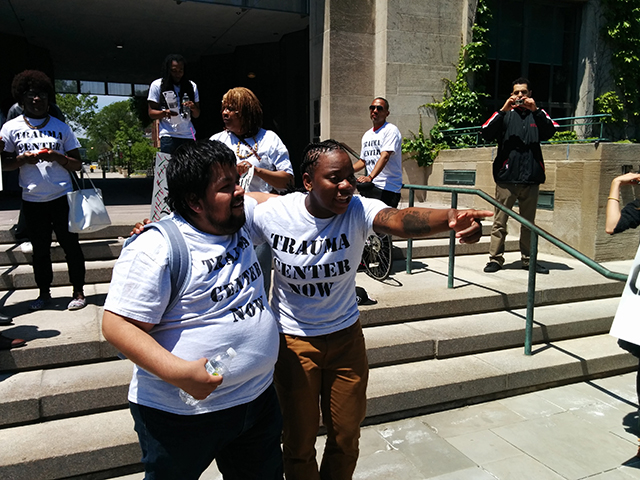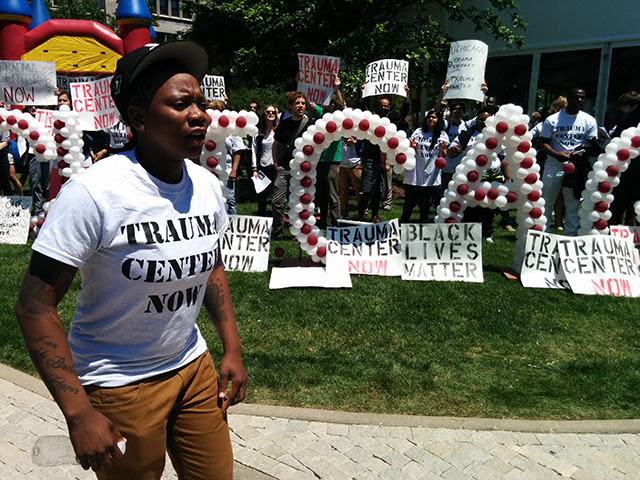
Did you know that Truthout is a nonprofit and independently funded by readers like you? If you value what we do, please support our work with a donation.
After years of protest, young organizers on Chicago’s South Side celebrated a major victory on Thursday as the University of Chicago announced plans to build and operate a Level 1 adult trauma center in an underserved community. A coalition led by the action-savvy group Fearless Leading by the Youth (FLY) has forced the issue of Chicago’s South Side “trauma desert” to the foreground of the city’s consciousness in recent years with confrontational tactics and a relentless campaign style. From a dramatic shutdown of the city’s Magnificent Mile to a building takeover that prompted the University of Chicago to tear out one of its own walls, the #TraumaCenterNow campaign has been remarkable both in spectacle and in strategy, and will no doubt be the subject of numerous case studies in the world of direct action and strategic campaign planning.
Veronica Morris Moore is an organizer with FLY and has been a leader in the movement to bring adequate emergency services to the South Side of Chicago. After a hectic weekend of responding to Thursday’s announcement, and planning next steps with her community, Moore took some time to discuss this historic moment with Truthout, and reflect on what it took to bring this victory about.
Kelly Hayes: There’s a lot of excitement with what’s happening with your group’s campaign to bring a trauma center to the South Side of Chicago. Can you explain a bit about your campaign, how it started and how it’s grown over time?
Veronica Morris Moore: In August 2010, Damian Turner was shot in his back during a drive-by shooting. When the ambulance arrived he was alive but by the time he got to the nearest trauma center at Northwestern Hospital he wasn’t. A close friend of Damian’s and FLY member, Brittany, said to an ally that FLY should fight for a trauma center because his loved ones were confused as to why the [University of Chicago] didn’t have one. And that’s what we did. We started with a march on September 28, 2010. That day would’ve been Damian’s 19th birthday. And if we weren’t marching for him he would’ve been marching with us for someone else that lost their lives traveling to the nearest trauma center 10 miles away.
Damian was committed to FLY and organizing. And his family, close friends, fellow youth organizers and allies were committed to the trauma center campaign. The campaign grew with the same spirit that young Black people founded FLY and continue to organize with. FLY members believe and understand change for the betterment of poor Black people has to come from Black people. If our lives matter then that means we should be able to have a say in decisions on issues that impact our community and everyday lives. We are not convinced that institutions and politicians are gonna do what’s best for us. So our reality is if what we need as young Black people to survive better than the ways most of us have to then we have to demand that our needs be met, by any means necessary. And that’s what we did for the past five years. We built power and community around young Black leadership fighting for young Black people and those directly impacted by gun violence, poverty and the lack of a trauma center on the South Side. With that foundation everything made sense; it meant fighting for a trauma center and against institutional racism.
 Activists from the Trauma Care Coalition disrupt the University of Chicago’s Alumni Weekend in June of 2015. (Photo: Kelly Hayes)
Activists from the Trauma Care Coalition disrupt the University of Chicago’s Alumni Weekend in June of 2015. (Photo: Kelly Hayes)
Yesterday, the Chicago Tribune announced that your demands were finally being met, but your group has issued a statement saying that the situation is much more complicated than that. Can you tell us what’s really changed, and what still needs to happen? Do you see this moment as a victory?
It’s definitely victory. We feel victorious. We knew this day would come. People power is a principle that grounds us in the work we do. And we are grateful that in our community people power is strong and alive. Being young, Black and oppressed is complicated so there’s always going to be struggle in our lives. We know that victory is not the end goal, liberation is. And a trauma center on the South Side does not liberate us from the oppression we had to fight for five years to get there.
Institutional racism is still prevalent in the way institutions like the University of Chicago engage with poor Black people. The decision to not consult the directly impacted who fought for this when no institution cared is racist. We also believe placing it at Holy Cross and not on [the University of Chicago] campus is a symptom of the culture of racism. So our work to attack institutional racism through the policies and practices of powerful institutions such as [the University of Chicago] must continue.
As an individual, you’ve dedicated much of your life to this fight in recent years. How has your role in this campaign affected you, on a personal level?
This work has grounded me in labor and love. I’m appreciative of every single person that believed in me and helped me as I continue to grow. Community is everything to me now and I wouldn’t have that if not for FLY and everyone who contributed to the trauma center campaign. I do this work because I love my people and Black love is real and there are allies who do believe in our leadership as young Black people. And I got to feel that every single day for the past five years so I’ll forever be grateful for that and carry that with me.
As someone who has taken multiple arrests and invested countless hours in this campaign, what made you decide to sacrifice so much for this fight?
I’ve lived on the South Side all my life. I grew up knowing the difference between a gunshot and a firecracker. I never felt like it was just life. I understood something was wrong. At 16, I was invited to go to the US Social Forum in 2010 with a friend who was an organizer with FLY and on that trip I met three other young organizers who founded FLY in 2007 and started the Audy Home Campaign. I learned a lot from everyone there and also about the type of organizing FLY and STOP [Southside Together Organizing for Power] did through the members of the organization that I went to Detroit with.
 Activists from the Trauma Care Coalition disrupt the University of Chicago’s Alumni Weekend in June of 2015. (Photo: Kelly Hayes)
Activists from the Trauma Care Coalition disrupt the University of Chicago’s Alumni Weekend in June of 2015. (Photo: Kelly Hayes)
Three months later I was told by my friend that one of the FLY members that went to USSF with us was shot and he didn’t make it. And despite not knowing him personally, just having the experience of going to workshops, sharing meals, learning about the organizing work he did and his views, he contributed to my foundation of organizing just as much as everyone I engaged with at that forum. I went to a space where his friends who are also members and organizers of FLY were processing their grief. And in that process they struggled heavily with the fact that he had to go so far for help and the [University of Chicago] was so close. I knew I couldn’t save the next victim of a drive-by shooting, but I also knew a trauma center closer to our community would and I was convinced that fighting for one with the young people I met that night was what I could and should do.
And I have gained more than I could ever sacrifice for this work. Fighting for my people is a fight for myself. I can recall people my age in my community dying from gun violence since I was 14. It’s a problem that needed champions for a long time. And I trust FLY members to fight like hell for people so I’m committed to that fight.
This fight has been spearheaded by Fearless Leading by the Youth. For people who are unfamiliar, can you tell us who the members of FLY are and what makes that community unique in Chicago’s organizing scene?
FLY was founded in 2007 by a group of young people who lived in or near the Grove Parc housing on Cottage Grove [Avenue] in Woodlawn. Some of them – Darius, Corey, Damian, Cierra, JT and some other youth from the neighborhood – were a part of the original group that founded a volunteer youth group in Southside Together Organizing for Power. They got a lot of their friends and some family members involved and all of them were a part of the cohort of FLY members that founded the trauma center campaign. We were responsible for the earlier direct actions like marches, street takeovers, die-ins, sit-ins and other tactics that the coalition used as reference for escalation.
We weren’t some special bred youth organizers that was prepared for or understood what we had started. But we used our youth, creativity and anger to build a platform for our voices to be heard. As I said, we are the directly impacted. We are struggling Black people living in poverty-stricken neighborhoods that host poor schools, gangs and poor opportunities, especially for the youth.
How do you think this stage of your campaign fits into the current movement for Black lives in the United States?
As a young Black queer organizer, I feel affirmed by the trauma center campaign. The principles of the BLM movement helped us frame our tactic around the Obama library and I believe that framing our message with BLM principles put the [University of Chicago] in a big spotlight locally and nationally in terms of race issues. Having this national conversation about police shootings created opportunities to address gun violence in the Black community and the reality and root of the problem. Gun violence is the leading killer of young Black people in poor neighborhoods across this nation, and growing up on the South Side of Chicago, FLY members understand that gun violence stems from the economic violence that bankrupts our communities and bankrolls big business hospitals like the University of Chicago.
I’m proud that our beliefs and truths are what’s fueling our movements and shaping and changing our lives in many ways. FLY is unique because we are everyday people fighting for our lives and the lives of our people, and our truth is undeniable.
In this moment of tremendous progress for FLY and for the South Side of Chicago, is there anything you and FLY would like to communicate to activists waging similar battles around the country?
We gon’ be alright. Let’s commit to organize, protest, riot, reflect, heal, love and rise. And keep on doing it until we all are free.
Media that fights fascism
Truthout is funded almost entirely by readers — that’s why we can speak truth to power and cut against the mainstream narrative. But independent journalists at Truthout face mounting political repression under Trump.
We rely on your support to survive McCarthyist censorship. Please make a tax-deductible one-time or monthly donation.